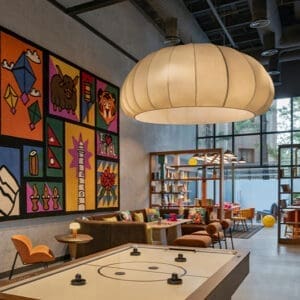 The indicators are that the UK is now moving out of recession and the evidence from the recent HOSPA conference held in London suggests that the hotel market is following if not leading that movement. Where the hotel market is perhaps different from that expected, is that the major areas of growth are within the midscale and economy sectors of the industry. The new supply is focused in the economy sector with products such as the Premier hub concept and Bloc. It is projected that the midscale and upscale will then follow in that order.
The indicators are that the UK is now moving out of recession and the evidence from the recent HOSPA conference held in London suggests that the hotel market is following if not leading that movement. Where the hotel market is perhaps different from that expected, is that the major areas of growth are within the midscale and economy sectors of the industry. The new supply is focused in the economy sector with products such as the Premier hub concept and Bloc. It is projected that the midscale and upscale will then follow in that order.
That may be the good news but the bad news is that the industry has yet to regain the position of revenue that reached its peak in 2007 before the crash.
London continues to lead the recovery with the regions now beginning to increase growth and showing robust positive trends in relation to occupancy and Average Daily Rates. The differential between London and the regions is unlikely to change given the “bubble” that London appears to operate in. The differential is best demonstrated by the average occupancy in the regions being of the order of 75% whilst in London is 82%, and the ADR in the regions being £65 and in London £140.
What is more encouraging for the regions is the changing nature of the marketplace, here there is evidence of group and corporate bookings growing and dispersing into the regions rather than being focused on London. With the emergence from recession corporate bookings are increasing but not necessarily directly back into the sectors where they may have been the strongest in the past. There is still an emphasis on value for money and the trading around across segments. With the possible exception of the upper upscale hotels the distinction between segments is becoming increasingly blurred with many of the economy and midscale properties increasing their range of services and facilities to corporate clients.
The dining out market has proved to be more resilient and recession proof than the hotel sector and the UK public continue to eat and drink out. In this sector there’s been a like-for-like growth over the last 19 months and total sales are up by over 5.6%. Slightly at variance from the hotel sector is the strong growth the has been seen in the regions where more restaurant openings are taking place especially in the major metropolitan areas. There were more than 1000 restaurant openings last year alone.
Where there is change in this market, is that brand loyalty amongst consumers no longer seems to hold true. Consumers now seem to be developing a repertoire of eating out experiences where they will have, within their own preferred brands and experiences, as many as 15 different preferred eating out options. They are also more likely to try new experiences seeming to seek a degree of authenticity and informality in the dining experience, especially if these are well promoted on social media and viewed as being “trendy”.
In both sectors it is the role of the consumer that is driving growth but that consumer is now choosing to make a purchase decision in different ways from that in the past. They have more discretion, more choice and are increasingly using mobile technologies and social media for sourcing information, trends and offers as well as replacing word-of-mouth referrals with trip advisor reviews, Facebook and Twitter posts.
For the UK, in both hotels and dining out, the landscape is changing, growth is evident, new concepts in hotels as well as eating out are being sought out by the customers whilst the future might look more positive it doesn’t provide for complacency.
 About the author
About the author
Professor Peter Jones, is the Dean of the eHotelier Academy. With a distinguished career in hospitality, education and training, Peter has been involved with national and international projects with clients involved in hospitality education. Peter is a Director the Edge Hotel School and of Hotel Future, a new education and training initiative in Greater Manchester and is a Visiting Professor at the University of Derby. He was also awarded a Member of the Order of the British Empire for services to the hospitality industry.















